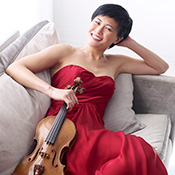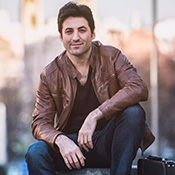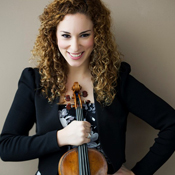
Violinist Karen Gomyo returns for Prokofiev’s Violin Concerto No. 1
David Lewellen
PUBLISHED
Tagged Under: Guest Artist, Musician, Violin
Playing world premieres gives Karen Gomyo a new perspective on how to play the classics.
Gomyo will play Prokofiev’s Violin Concerto No. 1, a repertory standard, this weekend with the Milwaukee Symphony, but she’s also preparing the first-ever performance of a concerto by Sam Adams with the Chicago Symphony in May. “That teaches you a different dimension,” she said. “We think of the old classics as something done. But we forget that they were people, very creative human beings. Just because you put something on paper doesn’t mean it’s permanent.”
Once, she asked composer Matthias Pintscher a question about his violin concerto that she was practicing, “and he wouldn’t give me his opinion. He said, ‘I wrote it; the rest is up to you.’ We can also treat music from the past this way. We shouldn’t box it up.”
But what about historically informed performance? Although less relevant to Prokofiev, a giant of the twentieth century, research in the past few generations has changed the way performers approach Baroque tempos, articulations, and ornaments. “That’s very, very important information,” Gomyo agreed, “but it shouldn’t limit what performers are capable of expressing. Have the background information and understanding – but ultimately the interpreter’s job is to make it relevant to himself or herself as a performer. It’s more interesting if the performer has a strong point of view.”
A part of Gomyo’s point of view now is her love of the Argentinian composer Astor Piazzolla, who she says transformed the genre of tango music. “He took traditional tango and morphed it into something uniquely his,” she said. “It’s become a part of who I am as a performer. It’s not something I do as a break from my other stuff. His music is a part of my heart.”
Gomyo has played before with the MSO, and with guest conductor Joshua Weilerstein — but not together. “It’ll be familiar in a positive sense,” she said. “I remember what Milwaukee is like, how to get to the hall, the vibe of the orchestra. But I haven’t played the Prokofiev with them before, so that’ll be a new experience.”
After not playing the Prokofiev for 12 years, she has it on her schedule at least three times this season. “I like to be able to repeat repertoire,” she said, “but there’s so many factors involved. It’s absolutely not up to me.” Unlike the typical fast-slow-fast structure, the middle movement is “a fast, witty scherzo,” and the rest of the piece is “magical, dreamlike, like a fairy tale.” Listening from the audience to a friend performing the piece, she felt that “you just get taken away to another world.”
Gomyo was born in Tokyo (her mother is Japanese), moved to Montreal with her family at age two, and moved to New York at 11 when she won a full scholarship to Juilliard to study with the legendary violin teacher Dorothy DeLay. “She was an incredibly wise woman,” Gomyo says of DeLay, who died in 2002. “Even if it’s a question about life, something like having a career as a woman, I still think, what would she advise?”
Her other teachers were Mauricio Fuks, a former student of Heifetz, and Donald Weilerstein, who happens to be the father of this week’s conductor. “They were all different,” Gomyo said, “but I carry a lot of each of them with me.” Another important mentor was the late cellist and conductor Heinrich Schiff. “He was a huge fan of the violin repertoire,” Gomyo said. “When I was in Vienna, I would play for him for five or six hours at a time. He’s another figure I wish were still around — very creative and very traditional as well.”
At 36, Gomyo already has a long list of accomplishments to her credit, but her mind is moving to bigger thoughts. “When you’re young, you focus on practicing and improving,” she said. “Now I’m thinking about, what is the meaning or purpose of music? How do we use music as a healing power?” She doesn’t yet have answers — but she’s thinking about how to have an impact beyond the concert hall.



